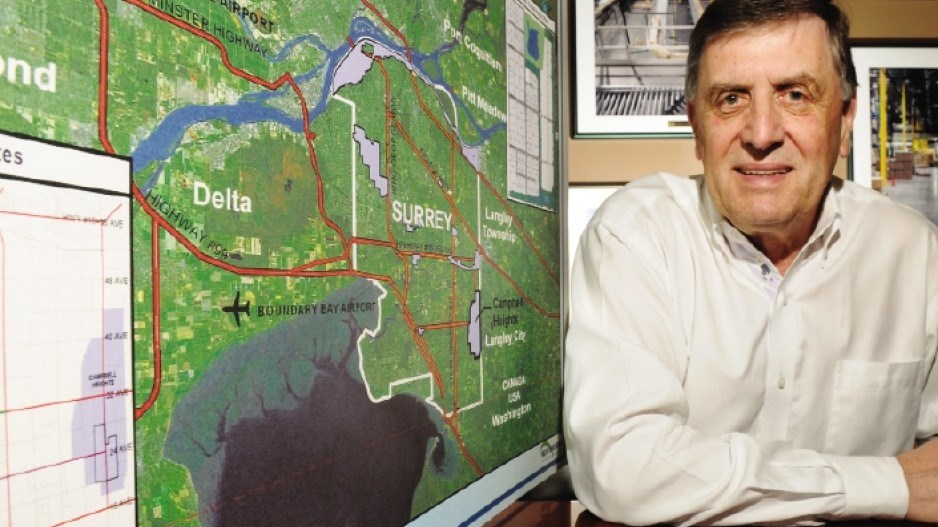Vancouver developer Ron Emerson faces an uphill battle to convince the Agricultural Land Commission (ALC) to exclude 226 hectares of land near Deltaport from the agricultural land reserve (ALR) and expand capacity for the Port Metro Vancouver.
The Emerson Real Estate Group owner told Business in Vancouver May 2 that he wants to build an intermodal yard and large warehousing facilities for major consumer goods distributors on farm land because that's the highest and best use for the property.
The result would be a shot in the arm for Metro Vancouver's drive to be a transportation gateway for goods from Asia.
Speculation had circulated that Emerson would buy 226 hectares of agricultural land, which he has thus far placed options on, for nearly $100 million and then sell that land to Port Metro Vancouver.
As an agent of the federal government, Port Metro Vancouver is not subject to provincial or municipal law.
Emerson's plan to either sell or lease the land to private retailers and distributors is a bigger challenge because, to exclude the land from the ALR, Emerson would first need the support of Delta council. Council would then forward the request to ALC staff, who would write a report and forward the request to ALC commissioners.
"Delta council and all councils I've been on since 1973 have supported the retention of agricultural land in Delta," Delta mayor Lois Jackson told BIV.
She said her constituents prefer that large distributors warehouse their products and load containers in the Fraser Valley – a stance that perplexes Emerson.
"There is no available land in the Fraser Valley," Emerson said. "Besides, the situation in the Fraser Valley is no different from Delta. The land is in the agricultural land reserve."
Building warehouses near Deltaport makes more sense than building in the Fraser Valley, he said, because it would speed transit times and relieve road congestion, which would be better for the environment.
Emerson has options to buy land next to rail lines and Highway 17. It is also large enough for 13,000-foot lineal paths that could be used by workers to load and unload trains that are now often 12,000 feet long.
"Trains wouldn't have to be broken up," he said.
The property would also be large enough for five million square feet of warehouse space.
That capacity would likely come in the form of many warehouses each larger than 400,000 square feet to serve the port and the province's Gateway project, which is intended to make Vancouver a prime thoroughfare for goods shuttling between Asia and North America.
Emerson said that because warehouses in the 50,000-square-foot range are too small to service that ambition, there has been a flurry of mega-warehouse development.
On March 1, tissue-maker Kruger Inc. moved into the largest single-level warehouse built in Metro Vancouver in one phase – a 504,000-square-foot facility built by the Beedie Group.
Other large warehouses built in recent years include:
•Hopewell Development Corp. building a 486,000-square-foot warehouse in East Richmond in 2008 for Containerworld Forwarding Services Inc. to store B.C. Liquor Distribution Branch inventory;
•Hopewell building a 480,000-square-foot warehouse that includes BMW Canada, Samsung Canada and Acklands-Grainger Inc. as tenants;
•Beedie building a 412,000-square-foot warehouse for Home Depot in Delta in 2009; and
•Beedie building a 450,000-square-foot warehouse for Brewers Distributor Ltd. in 2009 in Port Coquitlam.
Jackson and other advocates for saving farmland say the land that Emerson has options to buy has some of the best soil in the province.
But Emerson said the land that he wants to remove from the ALR is a tiny fraction of the 4.7 million hectares protected by that zoning.
Port Metro Vancouver vice-president of real estate Tom Corsie said Port Metro Vancouver bought its Richmond farmland with the intent to eventually develop industrial buildings.
He added that Deltaport badly needs intermodal capacity. The port announced May 1 that it is conducting environmental studies and technical work this month for its proposed Roberts Bank Terminal 2 project. The terminal is key to Port Metro Vancouver achieving its goal of tripling container traffic by 2030.
"That terminal would likely cost around $3 billion," Corsi said. "It's a very big project." •




